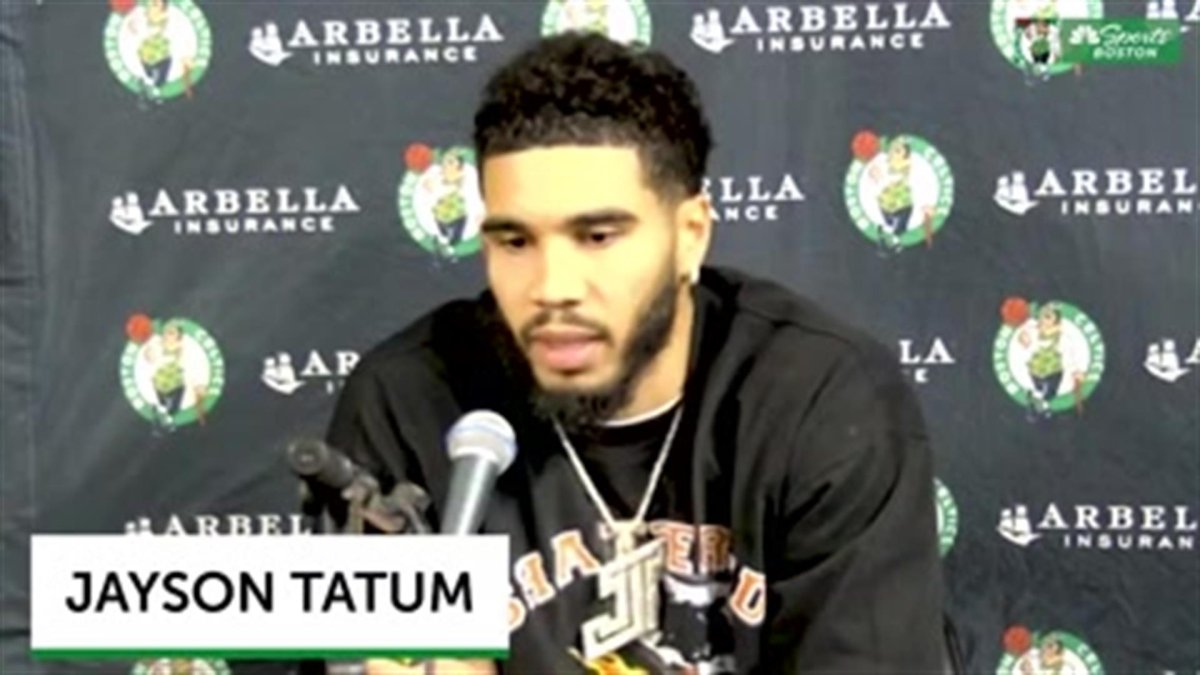
Jayson Tatum shares his thoughts on playing the Lakers ahead of Friday night’s match up against Los Angeles. Tatum says that as a kid, it’s these types of games you dream about playing in and you don’t take for granted.
The NBA’s first Native American player took the court shortly after the league officially formed in 1949.
Others of Native American lineage to play in the NBA have included Bison Dele (1992-1999), Cherokee Parks (1996-2004), Ron Baker (2017-2019) and Kyrie Irving (2011-current).
With November being Native American Heritage Month, here’s a guide to American Indians in basketball.
Stay in the game with the latest updates on your beloved Boston sports teams! Sign up here for our All Access Daily newsletter.
Who was the first Native American basketball player?
The first Native American to play in the NBA was Phil Jordon, a 6-foot-10 center who debuted during the 1956-1957 season with the New York Knicks.
Jordon -- whose father was of the Wailaki and the Nomlaki tribes, according to The Press Democrat -- spent seven seasons in the league. The California native averaged 10.9 points and 6.9 rebounds per game in his career, playing for the Knicks, Detroit Pistons, Cincinnati Royals and St. Louis Hawks.
Jordon infamously was unable to play against the Philadelphia Warriors on March 2, 1962, after falling ill, and the opponent he would have spent time defending, Wilt Chamberlain, went on to score 100 points in the game.
Boston Celtics
Find the latest Boston Celtics news, highlights, analysis and more with NBC Sports Boston.
Are there any Native Americans in the NBA in 2021?
Brooklyn Nets guard Kyrie Irving's lineage traces to the Standing Rock Sioux tribe in North Dakota. His mother, Elizabeth Larson, was born into the tribe before she was adopted at a young age.
Irving first revealed he was a descendent of the tribe in 2016, joining a list of Native American NBA players that also includes former players like Bison Dele, Cherokee Parks and Ron Baker.
Irving, whose mother died when he was four, has embraced his lineage in recent years, both on and off the court.
He paid homage to his native culture by performing a cleansing ceremony in which he burned sage on the court before playing against his former team, the Boston Celtics, last December.
Kyrie and his sister Asia both joined the tribe at a naming ceremony in 2018.
"Blood couldn't make us any closer, and our journeys have been directed in so many different ways, but yet we are still standing here," Irving said in 2018 while visiting the Standing Rock Sioux Reservation, per ESPN. "It shows how special and what it means to be a native of this country, and to be Native American."
Are there any Native American WNBA players?
Ryneldi Becenti became the first Native American to play in the WNBA when she debuted with the Phoenix Mercury in 1997 after signing as a free agent.
Becenti, also the first woman to be inducted into the American Indian Athletic Hall of Fame, played two seasons at Arizona State, averaging 7.1 assists per game.
Tahnee Robinson was the first Native American player drafted into the WNBA, having been selected with the 31st pick of the 2011 draft by the Mercury. She was traded to the Connecticut Sun before playing overseas.
Angel Goodrich was drafted two years later with the 29th pick by the Tulsa Shock. She started 16 of the 31 games she played as a rookie, averaging 4.4 points and 2.9 assists, and spent three seasons in the league.
Shoni Schimmel became the most accomplished Native American player in WNBA history. The 5-foot-9 guard was drafted with the eighth overall pick by the Atlanta Dream in the 2014 draft and went on to become a two-time All-Star, being named MVP of the game as a rookie. Over four seasons in the league, Schimmel averaged 6.6 points while shooting 36.6 percent from the 3-point line. Schimmel and her sister Jude, while playing for Louisville, became the first Native Americans to play in a Final game. Schimmel's 387 career 3-pointers while at Louisville ranks fifth in NCAA Division I history.